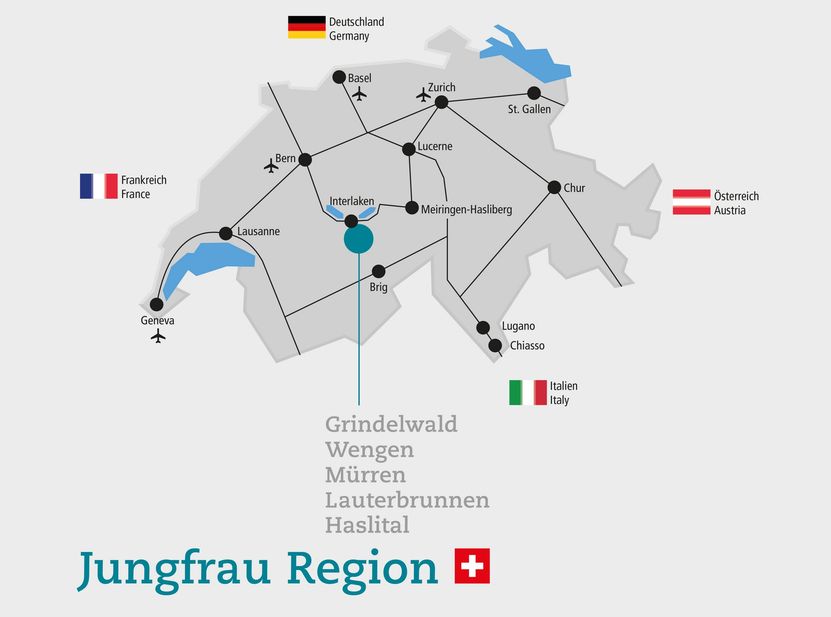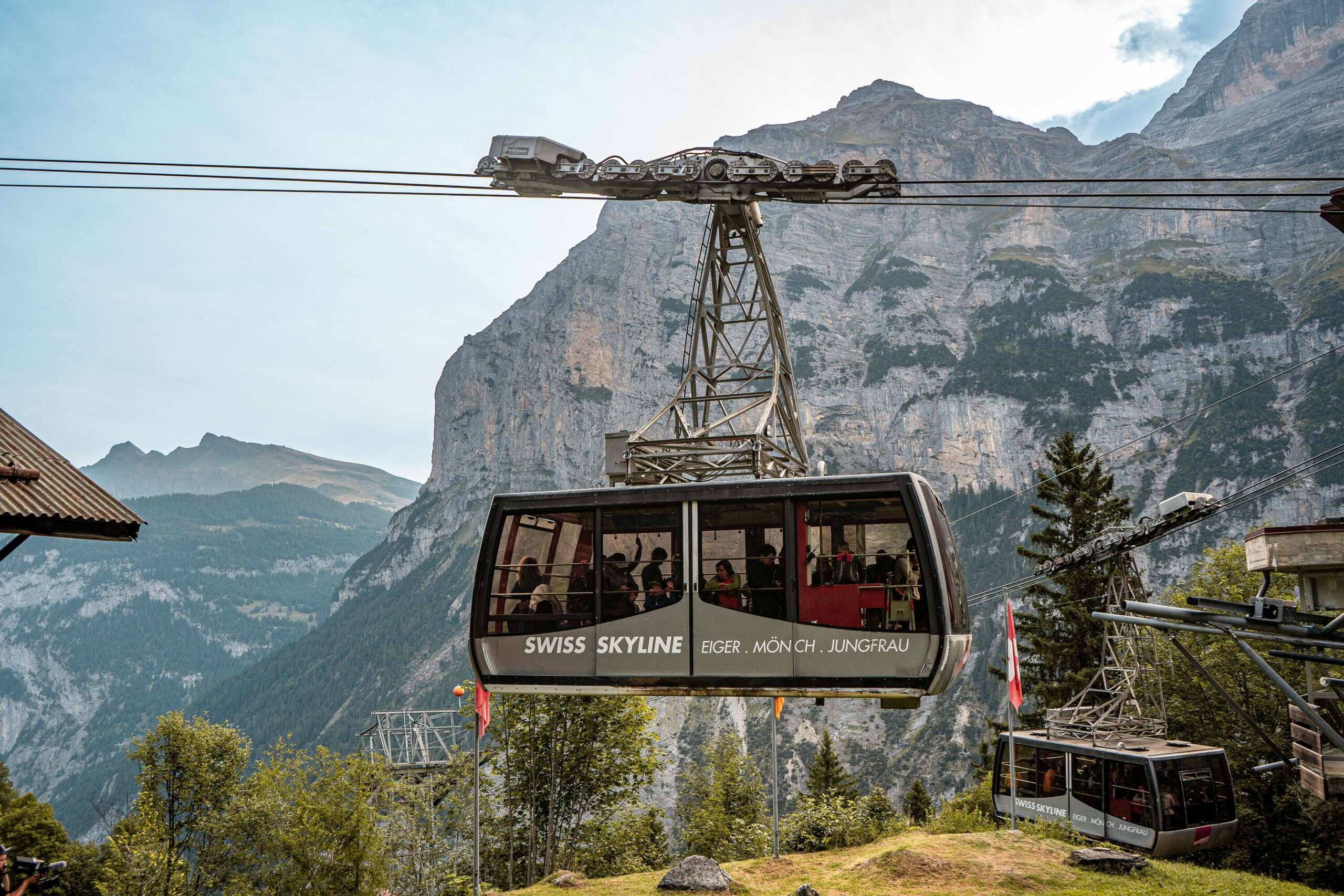Your route to Mürren
However you choose to travel to the region, Mürren is a car-free village that can only be reached from Lauterbrunnen by public transport, on foot or by bike.
From Interlaken Ost station, it takes 53 minutes to get to Mürren. The blue and yellow Bernese Oberland Railways (BOB) train will take you to Lauterbrunnen. You need to board at the front of the train, because the back section splits off at Zweilütschinen and heads to Grindelwald. You then have two options. Via Grütschalp (gondola cableway and train): at Lauterbrunnen station, you take the gondola cableway to Grütschalp. Here, you’ll transfer to a small train that will take you to Mürren. The journey from Lauterbrunnen to Mürren takes about 20 minutes. Alternative route via Stechelberg (bus and gondola cableway): in Lauterbrunnen, take the bus towards Stechelberg as far as the Schilthornbahn station. Then take the gondola cableway to Mürren via Gimmelwald. This journey takes about 30 minutes in total.
Mürren is a car-free village. If you are travelling by car, you must leave your car in Lauterbrunnen or Stechelberg and take public transport from there. The journey from Interlaken to Lauterbrunnen takes 20 to 30 minutes (depending on the season), and it takes 25 to 35 minutes to get from Interlaken to Stechelberg. In winter, expect snow-covered roads and black ice.
In Stechelberg, there is a car park directly at the bottom station of the Schilthorn cableway. There is also a multi-storey car park below Lauterbrunnen station. Alternatively, you can use the car park at the church. There is a bus from here to the station every half hour. There is also a free-of-charge ski bus that runs in winter. On foot it takes 10 to 15 minutes to arrive.
How to get to the Jungfrau Region
The Jungfrau Region in the Bernese Oberland has excellent public transport connections for whichever mode of transport you use to get here. Mürren is a car-free village that can only be reached from Lauterbrunnen by public transport, on foot or by bike.
Zurich Airport
There are direct trains from Zurich Airport to Interlaken Ost every two hours. There are also various other connections with changes in Bern to choose from.
Travel time: approximately two hours
Basel Airport
A bus will take you to Basel train station in about 15 minutes. Direct trains depart from Basel train station to Interlaken Ost five times a day. There are also various other connections with changes in Bern or Spiez to choose from.
Geneva Airport
There are various connections with changes in Bern to choose from.
Travel time: approximately three hours.
Travel without lugging luggage
Want to make your journey a little more relaxing? If you are flying to/from Zurich or Geneva, Swiss Federal Railways (SBB) can transport your suitcases, bags or skis from the airport directly to your hotel or holiday apartment – and back again, of course. Here's how!
Situated at the heart of Europe, Switzerland boasts one of the world’s best railway networks, with direct international train connections from more than 12 countries. Within Switzerland, you can take direct trains from Zurich and Basel to Interlaken Ost, giving you access to the Jungfrau Region. If you’re starting from Geneva, you’ll need to change trains at Bern. Interlaken Ost is also the final stop of the ICE line Frankfurt-Braunschweig-Berlin, and of the EC line Karlsruhe-Mainz-Cologne-Düsseldorf-Amsterdam.
There are also buses in Grindelwald (Grindelwald Bus), in the Haslital (PostBus and Engstlenalp Bus) and in Lauterbrunnen (PostBus).
You can find the timetables for all public transport in Switzerland here.
In the summer, you can buy a Bernese Oberland Travel Pass to use public transport for 3, 4, 6, 8 or 10 days. It is valid on almost all public transport in the Bernese Oberland and gets you discounts on trips to Valais, Central Switzerland and even as far as Lake Geneva. You can purchase a Bernese Oberland Regional Pass at tourist info centres and train station ticket counters.
For unlimited travel throughout Switzerland, we recommend the Swiss Travel Pass.
For families, the Junior Travel Pass is of interest, It’s available at train station ticket offices, post offices and tourist offices.
The SBB Luggage Special is an option for having your luggage picked up at any address in Switzerland and transported to select hotels (and back again) within two days.
You can relax and be environmentally friendly by travelling on public transport. Then you can discover the Jungfrau Region by bike. Want to take your own mountain bike or road bike with you? No problem. SBB will transport your bike from station to station. You can also take it with you on the train and on many buses. You can find all the information here.
You can reach the Jungfrau Region by car from Basel/Zurich/Geneva via Bern or from Lucerne via the Brünig Pass (open in summer and winter). Approaching from the south, you can reach the Bernese Oberland via the Grimsel or Susten Pass (only open in summer) or via the Simplon Pass (followed by the Lötschberg car shuttle train).
Our top tip: Park your car at one of the approximately 600 SBB P+Rail stations and then simply hop on a train to the Jungfrau Region. In winter, you get 50 per cent off the weekend parking fee.
The following companies offer private shuttle services from the airport to the Jungfrau Region or can provide custom transfers on request:
GrindelwaldBus, Grindelwald
+41 33 854 16 16
grindelwaldbus.ch
Grindelwald Reisen, Grindelwald
+41 33 853 03 03
grindelwaldreisen.ch
Oberland Reisen, Grindelwald
+41 33 828 17 17
oberlandreisen.ch
Garage & Taxi, Stechelberg
+41 33 855 17 42
garage-gertsch.ch
Stäger Transporte, Mürren
+41 33 855 24 80
Markus Feuz Transporte, Mürren
+41 33 855 18 70
Alptransfer
+41 58 580 07 71
alptransfer.com
Alpexcursion
+41 58 580 07 77
alpexcursion.com

Get around safely in Switzerland
Switzerland is one of the safest countries in the world, but thefts can still happen. Since it’s always better to be safe than sorry, we’ve put together a few safety tips for you at safertravel.ch. These should help ensure that you don’t lose your passport, valuables or luggage. There is also advice on what to do if you do end up losing something important.





